Funeral home owners are changing the way we celebrate the end of life

If you were to travel back in time 50, 100, or even 200 years, many of the funeral customs you observed would be similar to those you have attended in recent years. In early Puritan times, American funerals were somber and silent, and the wake was held afterward at the nearest pub.
In the late 19th and early 20th centuries, the profession of mortician (whose duties today usually fall under the purview of the funeral director) expanded to offer mourning clothes, burial clothes, flowers, preparation of the body, and coordination of funeral services such as casket, burial site, and transportation. But consumer protections aside, enacted in 1964 by the Federal Trade Commission to provide greater transparency about funeral costs, the trappings and traditions of many funerals have remained largely unchanged for generations.
But some, like Erica Hill, president of Sparrow Contemporary Funeral Home in Brooklyn, N.Y., believe traditional funerals are long overdue for an update.
"I came into this business because I had experienced a lot of loss," Hill says. "I used to go to funerals and always left with the feeling that the person who died was not truly represented." That led to the creation of Sparrow, a full-service company that offers a full range of services to help families create a unique experience of saying goodbye to their loved ones, as well as grief support groups and artful urns.
And she's not the only one helping people approach funerals differently. Some companies, such as A Life Well-Lived Memorial Services, offer memorial services that include customized details, such as a food truck offering the deceased's favorite dishes or a tree-planting ceremony honoring a favorite gardener.
Other companies go to greater lengths. Memorial events by New York-based Going Out in Style sometimes include art installations, champagne towers, and burlap bags, which are typically seen at red carpet events. Other non-traditional funerals, such as those organized by The Natural Funeral Company in Loveland, Colorado, incorporate eco-friendly practices that care for the Earth just as we care for our dearly departed.

Others, however, offer eco-friendly burials that honor the traditions of the past while caring for our shared future. "Historically, this is how most of the world was buried until 1867, when modern embalming with chemicals came along," says Joelle Simone Maldonado, aka "Grave Woman," a sacred grief specialist and black care educator.
These leaders are paving the way by actively supporting families in their grief, planning funerals that feel more like a celebration, and educating fellow body caregivers on how to better care for people from outside their own culture. Here's a closer look at a few notable companies changing the funeral home industry:
Going out in style
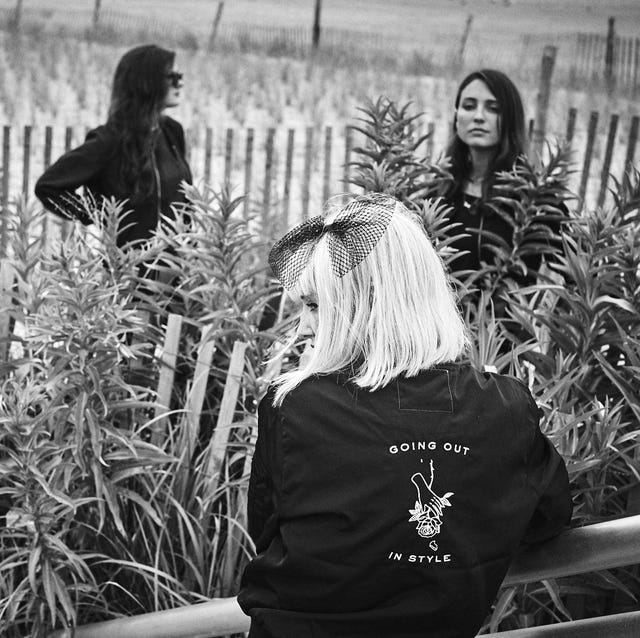
Going out in style
New York City-based friends Colleen Banks, Naomi DeManana, Erin Furey and Cassidy Iversen met when they worked as style editors at Martha Stewart Weddings magazine , preparing personalized weddings and events. But in their personal lives, they noticed that another major live event they attended - funerals - were formulaic and boring. "We saw an opportunity to apply the same attention, detail and beauty we had been taught to weddings," Banks says.
In 2016, friends formed Going Out in Style, a company specializing in end-of-life events that often draw on cultural traditions of the past - such as beautiful Victorian customs - while celebrating the deceased person's signature style. These "phenomenal send-offs" can include calligraphy, caviar, live performances, art installations, champagne towers, mourning veils for attendees, burlap, paparazzi and velvet ropes. "Our favorite clients crave originality, they are or were unique individuals in their lifetime and want to be remembered as such after they die," says DeManana. "They would never throw a boring event for their friends!"
Death has traditionally been a taboo topic, but their event planning experience has shown them that there is an appetite in the world for events that will help honor the deceased and help grieving families in their time of need. "Self-expression seems to be more important to people than ever, so why not bring that to your last event?" said Furey.
Their experience in creating beautiful weddings allowed them to learn the details of a client's life and what was important to them. YODO is their motto: you only die once. "You never get a second chance to make a last impression," says Iversen. They welcome unique requests and see funerals modernizing by embracing "more beauty, romance and sentiment" and "more drama, humor and fun."
Grave woman
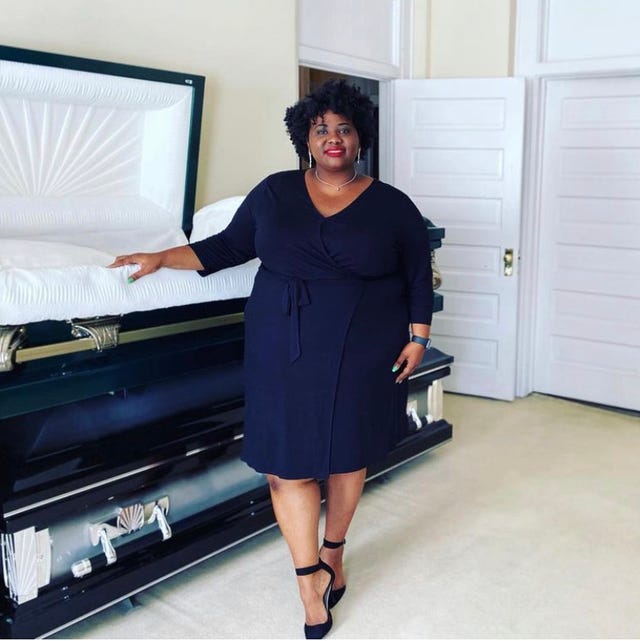
Grave woman
Joelle Simone Maldonado, called "The Gravedigger," is a licensed funeral director, embalmer, and sacred grief worker living in South Carolina who helps families care for deceased loved ones by preparing them for their final reunion. She is also a licensed insurance professional who helps individuals and families plan the financial aspects of a funeral, such as discussing the details of the desired method of burial, selecting a funeral home, communicating personal aesthetic choices such as clothing, and making sure vital documents such as insurance and banking information are gathered and their location disclosed to family members who need the information.
But one of her most important roles is as a death educator for professionals working in the industry. "I was inspired by the fact that black body care is not a standard part of maritime education," she says. She now trains deceased body care and end-of-life care professionals in cultural competency for the spiritual, cultural and physical care of Black bodies. Through the Black Death, Grief, and Cultural Care Academy™ program, she trains death doulas, funeral directors and embalmers, nurses, and families in care practices such as the transitional and postmortem hair, skin, and cosmetic needs of black people.
"As black people, our hair has tremendous spiritual and cultural significance," she explained. "At the end of our lives, we depend on those entrusted with caring for us for this sanctuary. Shampooing, conditioning, detangling, removing braids and other attachments, and knowing how to properly care for and prepare curls and twists are all necessary skills for all hair care professionals at the end of life, during illness and especially after death."
When registration for her academy opens in September 2023, future courses will focus on cultural, spiritual and religious rites, rituals and customs.
"I share horror stories and experiences of encountering blatant racism," she says. "And also about the mistakes I've made as a professional, using it all as educational moments to encourage, enlighten and empower each of my students." Using her experience and connection to her community, she equips death doulas with a toolkit and navigation system for those in transition and their loved ones.
"Grief is not an emotion, it's an experience," she says. Through her work and free resources for all, such as the Death and Grief podcast and her YouTube channel, she helps black families not be traumatized while preparing for funerals and memorials. "When all is said and done, our families, loved ones, communities and the vessels through which our spirits move through this world deserve to be honored."
A natural funeral
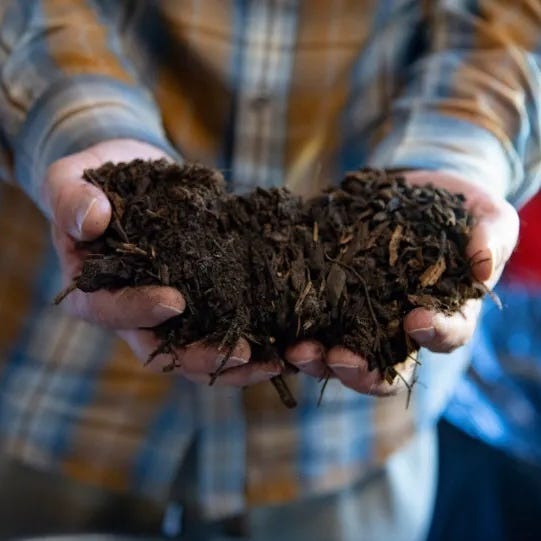
A natural funeral
For those with a penchant for the "back to the earth" philosophy, the services provided by The Natural Funeral may be a good fit. "The traditional funeral industry hands over the care of our loved ones to people who have never seen them and removes the family from the process," says Seth Viddal, CEO of The Natural Funeral. "We wanted to create a service that honors the needs, customs and rituals of each unique family."
His holistic funeral home does this by helping families participate in rituals they have named Reverent Body Care. "Families participate in physically washing, dressing and loving their loved one in preparation for the service, which can include a large audience," Widdal says. Reverent Body Care groups consist of about six to eight people "so that we can hold an emotional, vulnerable and tender container where families can express love and grief in a beautiful and intimate way."
More recently, he notes a growing demand for the company's more environmentally friendly technologies, such as water cremation and body composting, although these services are not yet authorized in all 50 states. Currently, alkaline hydrolysis (or water cremation) is authorized in 28 states, with approval bills pending in six more. Natural organic reduction (or composting of the human body) is currently authorized in only seven states. However, legalization of the technology is on the rise. "Nevada [recently] became the seventh state to legalize natural organic reduction technology," says Viddal. "We expect many states to follow suit in the next few years."
In August 2019, The Natural Funeral became Colorado's first alkaline hydrolysis service provider. In September 2021, they brought natural organic reduction to Colorado. "These alternatives to traditional cremation and burial consume significantly fewer resources, do not pollute the environment, and allow our bodies to re-enter the cycle of life," says Viddal.
The movement towards eco-friendly funerals and green burials is growing across the globe. According to a report published by Emergen Research in June 2022, the green funeral market was valued at $517.54 million in 2021 and is expected to grow at a CAGR of 8.7% between 2022 and 2030, reaching $1,214.52 million in 2030. Earlier in 2015, a study by the Funeral & Memorial Information Council found that 64% of adults over 40 are interested in green funeral options, up from 43% in 2010, indicating that the green funeral movement has been growing for more than a decade.
This consumer interest in eco-friendly funerals and moving away from traditional burials is familiar to Viddal. "In the modern era, we have become more nomadic and tend to move around the country, making the cemetery somewhat outdated for today's lifestyle," says Viddal. "People prefer to keep the memory of their loved ones alive by scattering ashes, planting trees, releasing wildflower seeds and making jewelry with cremated remains."
Viddal believes convenience, price and environmental impact are the top three factors influencing today's funeral consumers. According to the National Funeral Directors Association's 2021 report, the median cost of a funeral and burial service is $9,420. "By comparison, our most expensive offering costs less than the national average," he says. But for the company's founders, who were themselves consumers of the traditional funeral industry, it's much more than just the motto: "We are the families we serve." For them, that means not only creating the kind of services they would want for their loved ones, but also ensuring that families feel involved in the care of a deceased loved one and that the environmental values of the person whose life has ended are reflected in their end.
Memorial Services "A Life Well Lived
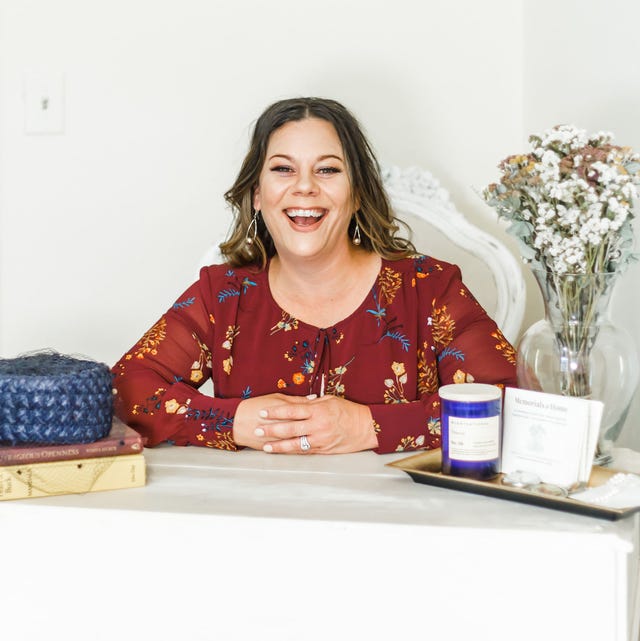
Rebecca Burnworth
"The very first celebration of life I organized was for a very unique person," says Rebecca Burnworth, a funeral and celebration of life event planner who founded A Life Well-Lived Memorial Service in Placerville, Calif. It all started after the spouse of her husband's business partner passed away. Bernworth volunteered to help organize and plan the week-long wake, as there were no children or relatives nearby to help.
Burnworth then saw the potential of honoring deceased loved ones in truly unique ways and became certified as a ceremony master, which works much like a wedding ceremony master and involves writing and conducting a personalized memorial service. "It allowed for a deep connection not only with each other, but also with the deceased," she says. Her work is inspired by the belief that there are healthy ways of experiencing death and grief in society that can help us to be more at peace with the inevitable.
Through her experience of celebrating life, she has seen that Americans today are less traditionally religious and more likely to embrace aspects of many cultures and faiths as part of their religious identity. For example, she said, a person who believes in the Christian God but also considers nature to be his church "may want a memorial that honors his Christian beliefs but is nature-themed." This might include planting trees or a service outdoors rather than in a church sanctuary.
She believes her clients - many of them baby boomers - are moving away from traditional funeral services. "They're kind of 'fiery,' independent thinkers who have led a lot of social change that has challenged tradition," she says. Boomers tend to be less religious and are leading the way in cremation, which has led them to embrace the "Celebration of Life," which Burnworth calls "a more elevated celebration" than traditional funerals. Rather than spending a budget on a funeral at a funeral home, many of her clients prefer to choose a beautiful place with good food. "They've really paved the way for celebrating individuality," she says.
One of her unique celebrations included a big barbecue in the park with an ice cream truck and bounce house, another included a haunted ship and hotel with a DJ for a fisherman who loved the ocean, ghost stories and an awesome party. But amid the fun and games, she advises families to find time and space for reflection and grieving. "We celebrate life," she says. "But their deaths must be honored and our grief must be acknowledged."
Sparrow
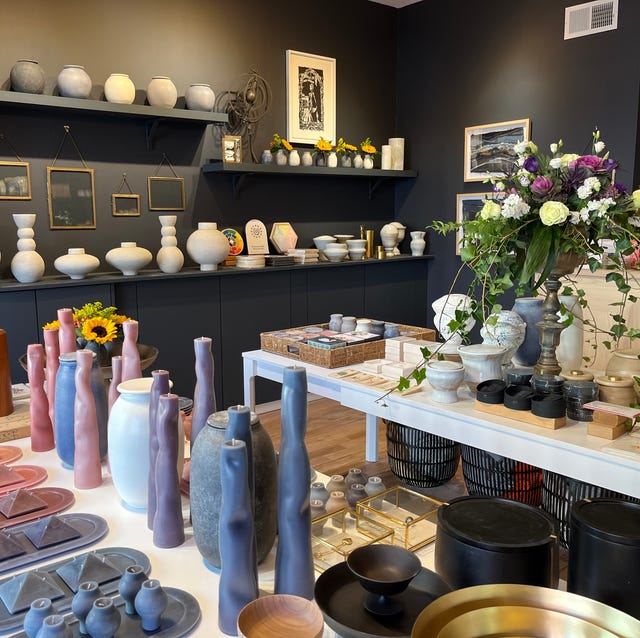
Sparrow
Erica Hill founded Sparrow in Brooklyn, NY, which allows families to create a celebration of life using elements of what's important to them, whether it's a traditional funeral or something more unique.
While she is not a licensed funeral director in New York State, where Sparrow is located, she works closely with Sparrow Funeral Director Alexander Agard to help create unique funerals and memorials. Agard's "white glove" work with families allows Sparrow to create authentic experiences - such as when a family didn't want their loved one encased in a box at a wake. "It ended up on a table that was draped in beautiful silk," she said. "Alex created a grove of cherry trees over it and there were candles all around." The family also requested that yoga mats be laid out so that everyone in attendance could meditate with her.
Another funeral honored a woman who did not like flowers but loved fruit. In this case, Agard created a grove of lemon trees and placed the woman in a wicker casket in the center. "Chairs surrounded her in the grove, so she was the center of attention," she says. "It's really beautiful to watch families fill the space in a way that feels authentic to them and feel like they're really honoring their loved ones."
Hill and her business partner Jennifer Herman Feldman recently bought a small cremation business in Los Angeles, and she continues to run the business while having daily discussions with Agard about how they can work better to continue to grow and, most importantly, serve more families.
Sparrow also has a store with a separate entrance that sells unique urns made by independent artisans, many of whom had never made an urn before Hill approached them. "While Sparrow also offers urns that a family can purchase at 'any funeral home,' it is Sparrow's unique approach that sets them apart from others, even from neighborhood residents who stop by to buy a special candle or card." Sparrow also offers services such as grief walks and support groups through the psychological organization Dwellness to help grieving community members even after the funeral services are over.
These unique celebrations and services are designed to help families grieve in a way that suits them - like the family who recently came to Sparrow after losing a child. "They wanted their child to be buried on the same day," she said. "So [Agard] literally picked up dirt and covered the child with it so she could touch the dirt, kind of like burying her in a coffin." Parents were able to watch this process. Hill says it's that kind of attitude that allows them to help their clients. "It was so touching and important to this family."